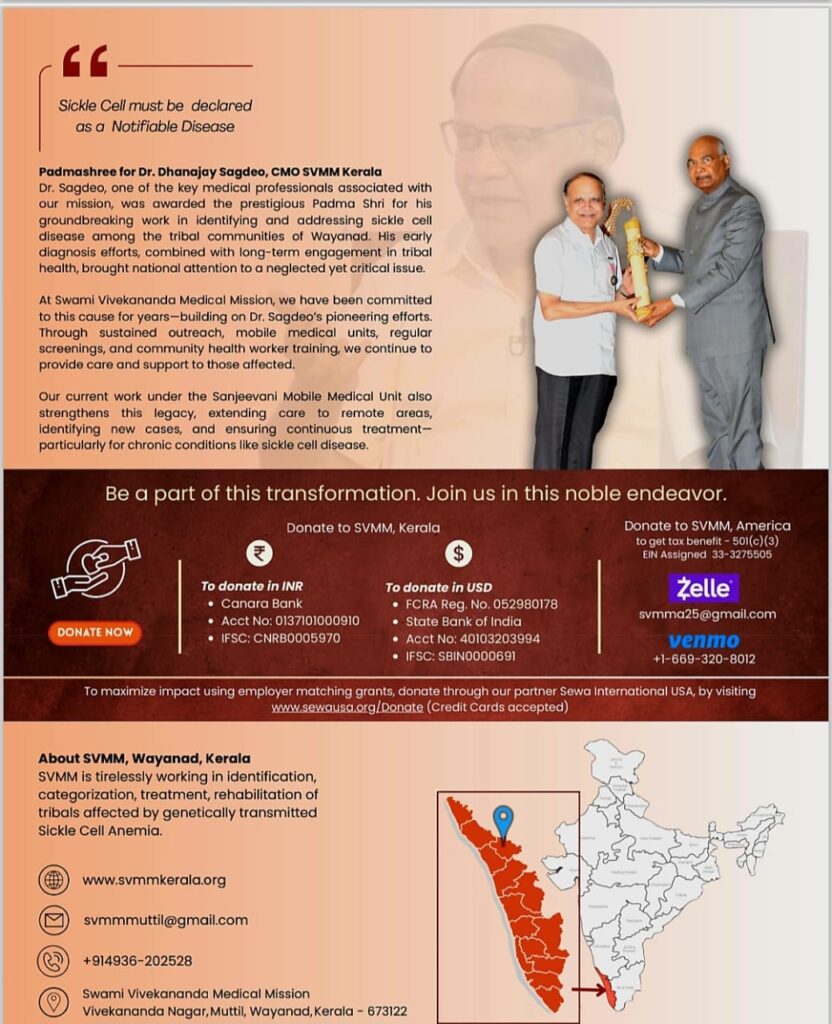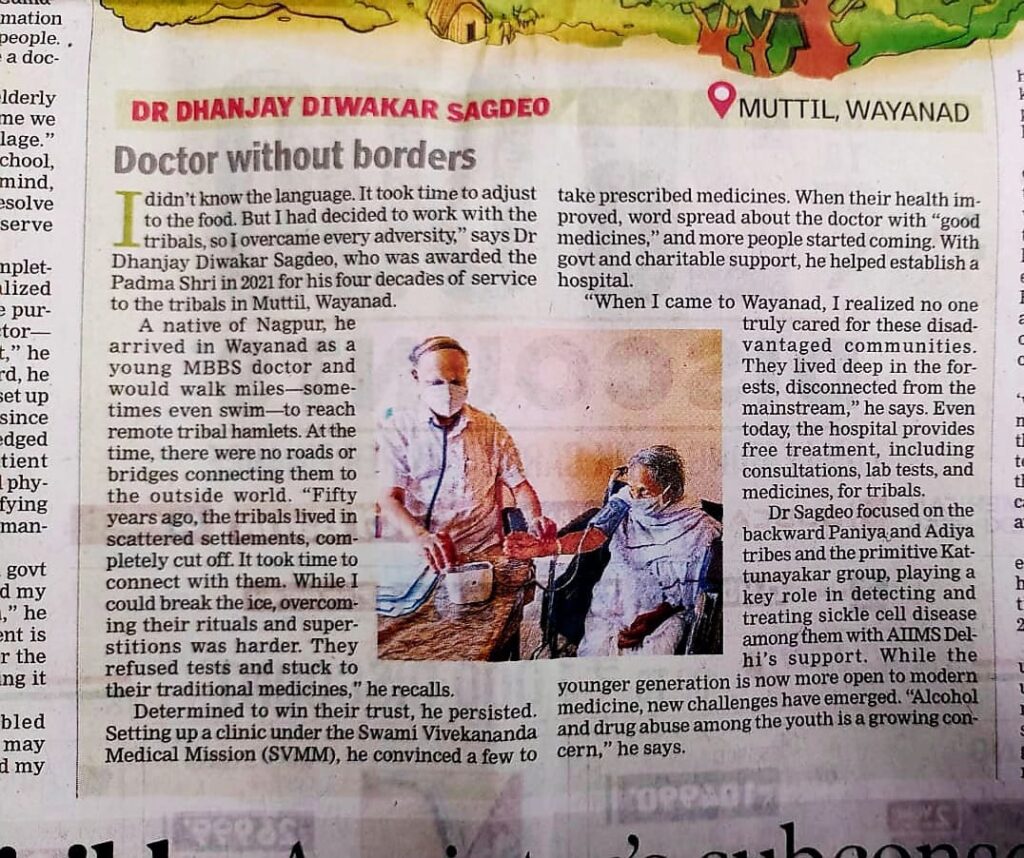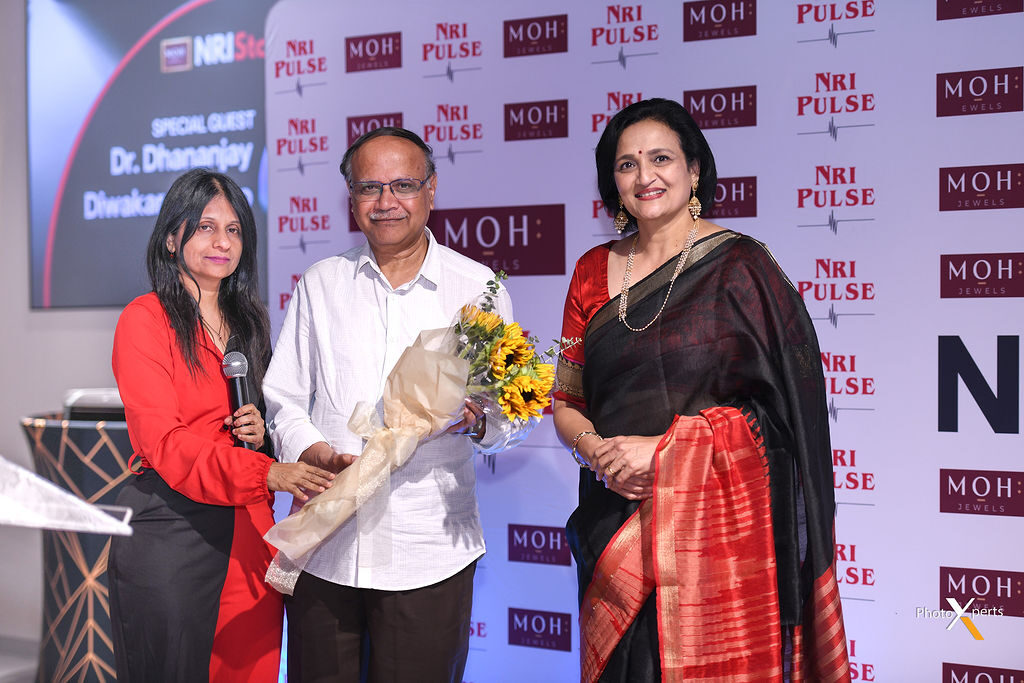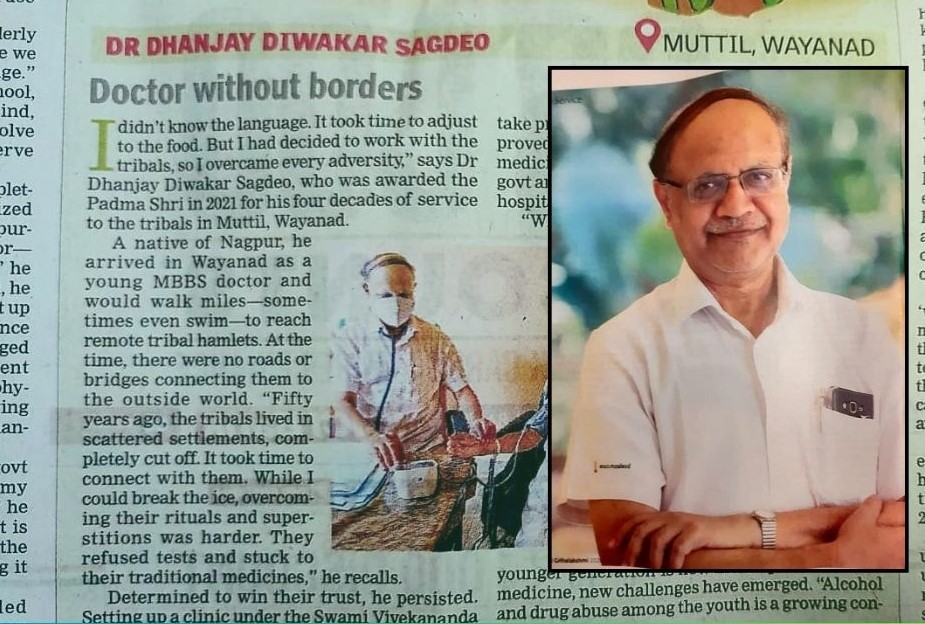BY JYOTHSNA HEGDE
Padma Shri Dr. Dhananjay Diwakar Sagdeo, Chief Medical Officer of the Swami Vivekananda Medical Mission (SVMM) in Wayanad, Kerala, has dedicated more than four decades to improving the health, education, and socio-economic well-being of tribal communities in India’s southern hills. A hematologist by training and a humanitarian by conviction, he has been instrumental in identifying and addressing Sickle Cell Disease (SCD) among Kerala’s tribal populations, while developing a comprehensive, community-based model of healthcare delivery in remote areas.
During his recent visit to Atlanta, Dr. Sagdeo collaborated with Sewa International to discuss expanding support for tribal healthcare and education projects in India. He was also honored at the NRI Stories event for his lifetime of service and initiatives towards social transformation.
Born and educated in Nagpur, Maharashtra, Dr. Sagdeo completed his MBBS degree from Indira Gandhi Medical College in 1980. Unlike most of his peers who pursued urban hospital careers, he chose a life of service in the tribal belt of Wayanad, a forested district in Kerala known for its difficult terrain, sparse infrastructure, and economically marginalized indigenous communities. “When I arrived in Wayanad more than forty years ago, healthcare facilities were almost nonexistent,” he recalled in an interview with NRI Pulse during his Atlanta visit. “There were no diagnostic centers, no hospitals for miles, and people often relied on local healers and rituals for treatment.”
His early years in Wayanad were marked by immense challenges. Working from a small clinic established under the Swami Vivekananda Medical Mission, he treated patients for fevers, infections, and malnutrition using limited resources. Gradually, as the needs of the population grew, the clinic evolved into a 36-bed hospital equipped with a laboratory, ECG facilities, ambulance services, and mobile dispensaries. True to the Mission’s motto “Manava Seva is Madhava Seva” (Service to humanity is service to God), all tribal patients receive free treatment and food.
A major turning point in his work came when he began observing recurring cases of unexplained fatigue, joint pain, and premature deaths among young tribal men and women. “When I went there, I found so many cases of severe weakness and young deaths without diagnosis,” he said. “There was panic in the community, and nobody knew the reason.” Suspecting a genetic blood disorder, Dr. Sagdeo approached the district authorities, who facilitated the involvement of a research team from the All India Institute of Medical Sciences (AIIMS), New Delhi).
The AIIMS team, working with SVMM, conducted field camps across tribal settlements, collecting blood samples for advanced testing. The results confirmed Dr. Sagdeo’s suspicion: Sickle Cell Disease (SCD) was prevalent among the tribes of Wayanad. The collaboration led to a four-year research project (1997–2001) jointly undertaken by AIIMS and SVMM, making it one of the first systematic studies on SCD prevalence in Kerala’s tribal belt.
Through this project, large-scale screening and classification were introduced. Each individual was issued an identity card categorizing them as:
- HBSS: Sickle Cell Disease patient (sufferer)
- HBAS: Carrier (with one affected gene)
- HBAA: Unaffected individual
The results were alarming — roughly 25% of the population were carriers. Since Sickle Cell Disease is hereditary and currently incurable, prevention became the cornerstone of intervention. Dr. Sagdeo and his team initiated pre-marriage genetic counseling, explaining to couples the risks of carrier-to-carrier marriages that could result in affected offspring. “Sickle Cell Disease is genetic, and there is no permanent cure,” he explained. “We now focus on screening and counseling so that two carriers do not marry and transmit the gene.”
The methodology and success of this community-based approach influenced the National Sickle Cell Anaemia Eradication Mission 2047, launched by the Government of India under Prime Minister Narendra Modi.

Yet, Dr. Sagdeo’s model was never limited to diagnosis and treatment. Recognizing the cultural and geographical barriers that prevented timely medical intervention, he pioneered a community health worker program that placed tribal people at the heart of healthcare delivery. The initiative, known as the Swasthya Mitra (Health Friend) network, trains tribal youth in first aid, health awareness, and patient counseling. “We realized that medical advice is effective only if it comes from within the community,” he said. “So, we trained tribal youth to be health communicators.”
Today, 125 Swasthya Mitras serve as the Mission’s grassroots health ambassadors. Their impact was particularly evident during the COVID-19 pandemic, when vaccine hesitancy was widespread. “Initially, people were not ready to take the vaccine,” he said. “But when our Swasthya Mitras spoke in their own language and explained its importance, acceptance increased. People came forward willingly.”
To further bridge accessibility gaps, SVMM operates two Mobile Medical Units, some funded by Sewa International, which travel across Wayanad’s rugged terrain to provide basic diagnostics, medicines, and referrals. These mobile clinics are often the only source of medical support in areas unreachable by public health infrastructure.
Through these years, Dr. Sagdeo came to understand that healthcare alone could not transform a community. Poor health was intertwined with illiteracy, unemployment, and social exclusion. In response, SVMM adopted a Five-Point Development Program that addresses Health and Hygiene, Education, Women’s Empowerment, Sanitation, and Livelihood and Skill Development.
“Education is the most important part of our work,” he emphasized. “Without education, socio-economic development is not possible.” To tackle high dropout rates, SVMM established a residential tribal school offering free education, nutritious meals, and transport facilities. Over 200 students currently attend, and many have gone on to higher education. Among the Mission’s proudest achievements are two young women from the tribal community who have earned MBBS degrees, symbolizing how far the initiative has come.
The Mission also runs 125 one-teacher schools across remote hamlets, vocational training units in bamboo craft and tailoring, 40 women’s self-help groups, and a Yoga Vidyalayam promoting holistic well-being. These initiatives have helped bridge the social and economic gap between tribal and non-tribal populations, fostering dignity and self-reliance.

During his Atlanta visit, Dr. Sagdeo met with leaders from Sewa International USA, exploring new ways to strengthen global partnerships for rural upliftment. Sewa International has been a steadfast supporter of three core SVMM programs — the Sickle Cell Disease Control Program, Tribal Education Initiatives, and the Key Project on sanitation and women’s empowerment. “Collaboration is important,” he said. “Sewa International’s support has allowed us to reach villages that were once completely inaccessible.”
His work has also inspired the Indian diaspora to participate in grassroots change. “When people in Atlanta learned about our mission, they came forward to support us financially,” he said. “This connection between the Indian diaspora and rural India is powerful — it sustains our efforts and gives us hope.”
In recognition of his unparalleled service to tribal welfare, Dr. D.D. Sagdeo was conferred the Padma Shri in 2021, India’s fourth-highest civilian honor. The award acknowledged his pioneering work in identifying Sickle Cell Disease among Wayanad’s tribes and his broader contributions to healthcare and education. “The award is recognition not just for me,” he said modestly, “but for the entire team that has been serving here for forty years. It validates the importance of our work and inspires us to continue.”

Despite the accolades, his outlook remains pragmatic. “Healthcare facilities are growing in India,” he noted, “but most of the focus is on urban areas. Remote regions are still neglected. The infrastructure is weak, and doctors are reluctant to work in difficult conditions.” To bridge this gap, he advocates establishing “Family Wellness Centers” — integrated hubs combining healthcare, education, nutrition, and livelihood training. “Health cannot be separated from other aspects of life,” he said. “A center that addresses all family needs — health, education, and income — is essential for sustainable development.”
Financing and human resources remain ongoing challenges. The Mission relies on a combination of government grants, CSR partnerships, and private donations, including support from family members and philanthropists in India and abroad. “Our hospital and school require regular funding for staff salaries, medicines, and educational materials,” he explained. “But we continue because the community depends on us.”
Under his leadership, the Swami Vivekananda Medical Mission now runs an extensive network of programs that serve tens of thousands of people annually — from hospital admissions and outpatient visits to free health camps and education programs. During natural disasters and the COVID-19 pandemic, SVMM has consistently extended emergency relief, reinforcing its role as both a healthcare provider and humanitarian institution.
Reflecting on more than four decades of service, Dr. Sagdeo remains hopeful about India’s future. “Our work has shown that with the right approach, it is possible to build trust, improve health outcomes, and empower communities from within,” he said. He continues to advocate for policy attention toward tribal health, including making Sickle Cell Disease a notifiable condition to ensure systematic tracking and intervention nationwide.
From identifying a hidden genetic disorder to building an institution that embodies compassion and self-reliance, Padma Shri Dr. Dhananjay Diwakar Sagdeo’s life and work represent the highest ideals of public service. His integration of medicine, education, and social empowerment offers a replicable model for inclusive rural development. As his collaboration with Sewa International and the Indian diaspora expands globally, his mission in Wayanad remains a testament to what one doctor’s unwavering faith in humanity can achieve — turning remote villages into centers of health, hope, and human dignity.



